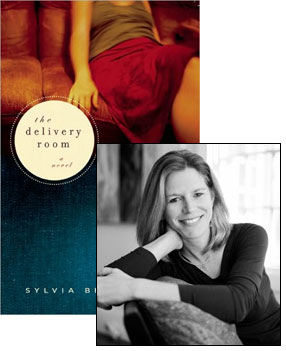Author2Author: Sylvia Brownrigg & Brenda Webster
When Brenda Webster responded to my invitation to do a guest essay for Beatrice by suggesting a Q&A with Sylvia Brownrigg, I was all for it—I interviewed Brownrigg a decade ago and admired her work greatly, and the themes of her latest novel, The Delivery Room, seemed to go well with Webster’s Vienna Triangle. The two authors will be making a joint appearance at Rakestraw Books (Danville, California) on March 19.
Sylvia Brownrigg: In writing a novel about Freud, how did you come to choose Viktor Tausk, his doomed protégé, as one of the major figures of your interest?

Brenda Webster: The idea for the novel came to me in Rome. I was reading Thomas Mann’s Lotte in Weimar about how Goethe sucked the life out of everyone near him and used it for his own purposes whether son, secretary or potential character. This sounded similar to something I had read years before about Freud and Tausk and made me wonder if genius was in general incapable of tolerating great talent. Since my mother thought of herself as a genius this had personal resonance as well.
SB: I am guessing from your memoir, The Last Good Freudian, that you drew on your own family’s relation to some of the historical figures in Vienna Triangle. Did you consciously use certain details from your own family history?
BW: Helene Deutsch, a prized member of Freud’s inner circle figures prominently in my book. My mother had been a patient of Deutsch’s in Vienna, after a suicide attempt, and seen Deustch later as well, and I had been told that she helped my mother with her sadism towards men and made it possible for her to marry. What I wasn’t told until near her death was that Deutsch had abruptly terminated her after a year saying rather brutally that some people just didn’t cut it. I hadn’t thought of this parallel with Tausk until you asked!
 SB: Both of these answers suggest that your view of analysis, as you have pointed out, is probably less favorable than mine—at least as presented in The Delivery Room. Or that you are especially alert to its potential dangers.
SB: Both of these answers suggest that your view of analysis, as you have pointed out, is probably less favorable than mine—at least as presented in The Delivery Room. Or that you are especially alert to its potential dangers.
BW: Your central character, Mira, is a psychoanalyst with several patients dealing with fertility issues, and I wondered whether you gave her a homeland riven by war, Serbia, in order to contrast with the theme of birth—or simply to make her more vulnerable and open to her patients?
SB: One of the issues I explore in The Delivery Room is the gap between how people see themselves, and how they are seen—the narrative’s change in points of view makes this possible. And that gap is heightened in the therapeutic dynamic, when the therapist reveals so little of her own background. Mira’s patients know that she is Serbian, and their responses range from suspicion, to ignorance, to a vague guilt… So partly I was showing up the complexities of how people understand each other—and also giving both sides a chance to reflect on the meanings of these wars fought from a distance. In 1999 NATO was dropping bombs on a European country! It was an extraordinary time.
BW: The idea that insight changes people is central to the analytic process. Did you have specific changes in mind for your characters when you started?
SB: I knew that each of the four patients would be making some progression through the course of the novel, and their work with Mira. As you say, questions of motherhood, and the longing for children, is something that all three of the female patients are grappling with. I felt that each of the
three—the one in mourning for a baby lost, and the two so desperately eager to have their own child—had to come to terms with their own future, whether or not it held motherhood for them.
BW: A fascinating question you raise is whether having children actually makes people happy. Mira’s patients passionately believe this. But Mira herself never wanted children, doesn’t want to lose herself, feels patients and her adult relationship with Peter are more than enough. Helene Deutsch, as I see it, was a lousy mother but talented analyst!
SB: In writing The Delivery Room I found myself believing that it would be difficult to be a great analyst, and also a great parent—it would be hard to have enough to give to both roles. What is your view about that? Your fictional protagonist, Kate, ends up having an almost daughterly relation with the aging Deutsch in your novel.
BW: I think anyone deeply involved in their work could have similar trouble, balancing work and motherhood. But what fascinates me in my book is the gap between theory and practice. Deutsch extolled motherhood. When my mother brought me to see her as a baby, she said “This is your greatest creation,†privileging baby over art. That is why I had Helene be so encouraging of Kate’s pregnancy. But Deutsch herself seems to have been an overly anxious, uncomfortable mother. Every time she had a choice between work and child, she chose work.
5 March 2009 | author2author |

 Our Endless and Proper Work is my new book with Belt Publishing about starting (and sticking to) a productive writing practice.
Our Endless and Proper Work is my new book with Belt Publishing about starting (and sticking to) a productive writing practice. 
